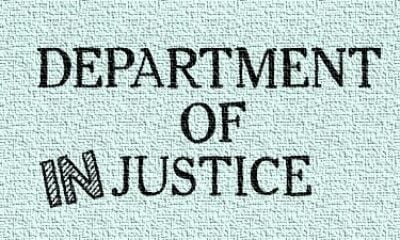

Business
Leftist Oppression: The Thought and Language Police
Political ‘correctness’ is a cultural battering ram employed by people who seek to silence and intimidate others.
In discussion with a liberal friend from high school, I found myself ruminating on why political correctness is so damaging to our society. Since the fraudulent 2020 election, and in particular since January 6, 2021, the Left has more blatantly dominated public discourse and is now enforcing an extreme edict of ‘political correctness.’ To have voted for Donald Trump is now considered a grievous sin. To take issue with the activities of BLM or Antifa is to risk ruining your career, maybe get beaten, and possibly be killed.
My high school friend asked, “If I’m requesting information from someone of a certain category (ethnic, racial, religious, national, etc), aren’t I more likely to be effective by acting or speaking in a way that makes him/her feel respected and equal?
Nothing Correct About It
If only political ‘correctness’ were confined to the view of it being appropriate and thoughtful use of language, employed to extract relevant meaning and to maintain effective relations. Unfortunately, it is a cultural battering ram employed by people who seek to:
1. Silence and intimidate others
2. Viciously label those who don’t agree with their viewpoint
3. Belittle them for the language used, even if such language is not offensive
4. Ruin their careers, if not imperil their safety
5. Diminish any activity, whatsoever, that doesn’t conform to such verbal fascism
Political ‘correctness’ (PC) advocates demand that everybody think like they do, and march on command as they direct. PC immobilizes others, such as well-intentioned government agents, from doing their jobs, protecting U.S. citizenry, and upholding the U.S. Constitution. Consider ’sanctuary cities’ and the city officials within them – they are at odds with the Constitution which affords protection to U.S. citizens.
Janet Napolitano, Secretary of Homeland Security in 2009, chose to not employ the term “terrorism,” even following despicable acts of terrorism on U.S. soil. After her initial testimony before Congress, she explained to a reporter that while she is aware of terrorism threats, she prefers to call them “man-caused” disasters. Man-caused disasters! Let that sink in…
PC is Deadly
PC is thought-control, pure and simple. It often impedes appropriate investigation into the nefarious activities of certain individuals. As such, PC can be deadly. In 2015, many individuals questioned the behavior and activities of the San Bernardino, CA Islamic husband and wife who became mass murderers. The observers consciously avoided reporting them, however, due to the couple’s minority status.
In April 2016, the Department of Justice, under Obama, coined new terminology for convicted criminals: They now were to be cited as ‘justice-involved individuals.’ Youthful offenders were to be deemed ‘justice-involved youth.’ Such language restriction and contortion borders on lunacy. Big Brother would approve.
In Orlando, FL in June 2016, the same phenomenon occurred as in San Bernardino: An Islamic mass murderer was known in advance by many others to be potentially violent and unhinged. Whoops!: 49 people died, many others were gravely injured, and the town, the state, and the nation was in shock. If the shooter employed a bomb instead of a gun, he could have murdered nearly 350 people, not “merely” 49.
Verbal Fascism
Following the Orlando massacre, the Obama Administration mandated that the Department of Justice, Homeland Security, and other agencies be barred from using the words “jihad” and “Sharia.” Today, as we know too well, a single word in a single tweet that is disapproved by the ‘woke’ crowd might end one’s career; likewise, a comment that one uttered 30 years ago.
PC is the curse of our times and the go-to tool of domination. It contends that Caucasians, primarily western males, are the embodiment of oppression and that their views, behaviors, and actions are inherently wrong because they are Caucasian, western males.
PC has its own vocabulary, such as “white privilege,” “micro-aggression” and “mansplain.” Such terms are designed to squelch the observations, experiences, rationale, and worthiness of the presumably non-conforming opposition.
In PC culture, minorities can do little wrong, because they are minorities, and that the consequences of their behavior are excusable. Consider Michael Brown of Ferguson, Missouri. At age 18, he had a sealed juvenile rap sheet. It has been proven that Brown did not put his hands up and did not say, “Don’t shoot,” prior to his demise.
Such individuals are regarded as the “continuing victims” of the Caucasian western male-dominated society. Thus, PC advocates bestow upon them a de facto life-time pass for any socially destructive behavior.
In the Distant Future
May your children and grandchildren one day live in an era when political ‘correctness’ has been swept out of our society.
– – – – –
We'd love to hear your thoughts about this article. Please take a minute to share them in the comment section by clicking here. Or carry the conversation over on your favorite social network by clicking one of the share buttons below.
Join the conversation!
We have no tolerance for comments containing violence, racism, profanity, vulgarity, doxing, or discourteous behavior. Thank you for partnering with us to maintain fruitful conversation.
Business
Work-Life Balance in Your Life
It the ability to experience a sense of control and to stay productive and competitive at work while maintaining a happy, healthy home-life
Work-life balance (WLB) is the ability to experience a sense of control and to stay productive and competitive at work while maintaining a happy, healthy home-life with sufficient leisure. WLB, also referred to by some as work-life harmony, work-life shift, work-life blend, work-life effectiveness, or work-life integration, requires focus and awareness despite seemingly endless tasks and activities competing for our time and attention.
Work-life balance entails having what I call “breathing space” for yourself each day, feeling a sense of accomplishment while not being consumed by work, and having an enjoyable domestic life without short-changing career obligations. WLB is rooted in whatever fulfillment means to you within the course of a day and a week, and however many years you have left in your life.
Supporting Disciplines
Several disciplines support work-life balance though, individually, none are synonymous with work-life balance:
1) Self Management
Sufficiently managing one’s self can be challenging, particularly in getting proper sleep, exercise, and nutrition. Self-management is the recognition that effectively using the spaces in our lives is vital, and that life, time, and available resources are finite. It means becoming captain of our own ship; no one is coming to steer for us.
2) Time Management
Effective time management involves making optimal use of your day and the supporting resources that can be summoned – you can only keep pace when your resources match your challenges. Time management is enhanced through appropriate goals and discerning what is both important and urgent, versus important OR urgent. It entails understanding what you do best and when, and assembling the appropriate tools to accomplish specific tasks.
3) Stress Management
By nature, societies tend to become more complex over time. In the face of increasing complexity, stress on the individual is inevitable. More people, noise, and distractions, independent of one’s individual circumstances, require each of us to become more adept at maintaining tranquility and being able to work ourselves out of pressure-filled situations. Most forms of multi-tasking ultimately increase our stress, while focusing on one thing at a time helps decrease stress.
4) Change Management
In our fast-paced world, change is virtually the only constant. Continually adopting new methods, adapting old, and re-adapting all methods is vital to a successful career and a happy home life. Effective change management involves offering periodic and concerted efforts so that the volume and rate of change at work and at home does not overwhelm or defeat you.
5) Technology Management
Effectively managing technology requires ensuring that technology serves you, rather than abuses you. Technology has always been with us, since the first walking stick, spear, flint, and wheel. Today, the rate of technological change is accelerating, brought on by vendors seeking expanding market share. Often you have no choice but to keep up with the technological Joneses, but rule technology, don’t let it rule you.
6) Leisure Management
The most overlooked of the work-life balance supporting disciplines, leisure management acknowledges 1) the importance of rest and relaxation, 2) that “time off” is a vital component of the human experience, and 3) that one can’t indefinitely short-change leisure without repercussions. Curiously, too much of the same leisure activity, however enjoyable, can lead to monotony. Thus, effective leisure management requires varying one’s activities.
Entirely Achievable
Achieving work-life balance does not require radical changes in what you do. It is about developing fresh perspectives and sensible, actionable solutions that are appropriate for you. It is fully engaging in life with what you have, right where you are, smack dab in the ever-changing dynamics of your existence.
– – – – –
Business
Work-life Balance: The Enduring Quest
Organizations today recognize the importance of supporting employees’ well-being while maintaining productivity
Thank goodness that organizations today increasingly recognize the importance of supporting employees’ well-being while maintaining productivity. As such, the corporate quest for work-life balance, harmony, and integration has gained great prominence.
Key Aspects
Here are 12 key aspects of this pursuit gleaned from a variety of programs:
1. Offer Flexible Work Arrangements: Offering flexible work schedules, remote work options, and part-time opportunities allows employees to better balance their professional and personal lives.
2. Have Clear Policies: Establishing clear policies and guidelines regarding work hours, overtime, and expectations helps employees manage their time effectively.
3. Support Mental Health: Providing access to mental health resources, counseling, and stress management programs can address employees’ emotional well-being.
4. Give Leave: Offering generous paid time off, including vacation, sick leave, and parental leave, allows employees to address personal and family needs without fear of repercussions.
5. Prevent Burnout: Encouraging employees to disconnect from work-related technology after hours helps prevent burnout and supports work-life separation.
6. Support Workload Management: Ensuring that employees have manageable workloads and realistic deadlines prevents excessive stress and long working hours.
7. Provide Wellness Programs: Implementing wellness initiatives, such as fitness facilities, nutrition programs, and health screenings, promotes a healthier work-life balance.
8. Enable Employee Assistance Programs: Such programs provide confidential counseling and support services for employees facing personal challenges.
9. Promote a Culture of Balance: Company culture plays a significant role in work-life balance. Leaders should model a balanced lifestyle, and the organization should celebrate accomplishments beyond work.
10. Maintain Continuous Communication: Engaging in open dialogues with employees about their needs and concerns regarding work-life balance fosters a supportive and responsive corporate culture.
11. Empower Workers with Training and Education: Providing training on time management, stress reduction, and resilience equips employees with the skills to better balance their lives.
12. Leverage Remote Work Policies: Crafting clear remote work policies and expectations ensures that remote employees have a structured work-life balance.
Bringing in the Hired Gun
As the world’s only holder of the title, “The Work-Life Balance Expert®,” as issued by the USPTO, I am often summoned by organizations to enhance work-life balance for their troops. In all, I’ve delivered programs and spoken to 960 groups. Below depicts an encounter with a company who shall remain nameless for reasons of confidentiality. See if this squares up with your experience in your organization.
The following responses were derived as a result of my sending a questionnaire to the conference meeting planner where I was to be their keynote speaker. I requested the names of 10 people who would be in the audience. I called each of them to discuss their current challenges. Here are their actual replies to three of my questions:
1) If you could magically resolve a work-life balance issue, what would it be?
* Have more breathing room between high-level projects.
* Accomplish more during the workday and leave mentally free.
* Hire more staff!
* Take vacations and time off with no big pile ups when returning.
* Be allowed to take some Fridays off and catch up on much needed appointments.
* Reduce the number of pop-up requests and questions flying at me all day long so that I could ACTUALLY do what I need to do each day.
* Be approved to work from home or adjust my hours. My personal time isn’t respected.
2) What do you seek to derive from attending a session such as mine?
* Manage my time more effectively.
* Gain tools to embrace life while living it
* Develop stronger skills.
* Make work-life balance a reality in our company’s work-first culture.
* Acquire strategies, tips, or ideas to re-think my approach.
* Learn to change my focus, to be more productive, balanced, and focused.
* Be able to balance the few things that I do control during my day.
* Discover tips for keeping my staff in balance.
* Gain a realistic expectation of what we can achieve or experience.
* Develop a more positive outlook for the group.
3) Are there any observations you could offer?
* Work-life balance is a huge topic organization-wide. We are high performers who want to do a good job. We compromise our personal lives to meet work demands. We have to keep pace with the leaders and teams we support. If we don’t, we’ll be deemed unresponsive.
* A frenetic pace seems to be inherent in this company. Our team does a good job of emphasizing work-life balance; the problem lies with the surrounding divisions that thrive on working all the time, for no good reason. Yes, we are in a global space, working in different time zones, but some of these people are beyond the pale.
* What I love about this organization are the people. They are dedicated to the cause and truly want to deliver reliable, affordable, dynamic, and versatile solutions to our customers. However, our frenetic pace isn’t necessary. Not every project is the most vital. Not every problem is an emergency. Not every request has to be filled now.
* If in charge, I’d implement a more efficient, logical pace organization-wide. If we all took a breath and reevaluated how we work, in a more focused environment, we might find that we could produce better results with less stress.
Resonates Strongly
As you can see, the topic of work-life balance resonates strongly among today’s career professionals. Going forward, may more organization recognize and acknowledge the critical role that employee wellness and work-life balance has on the organization’s overall effectiveness.
– – – – –












